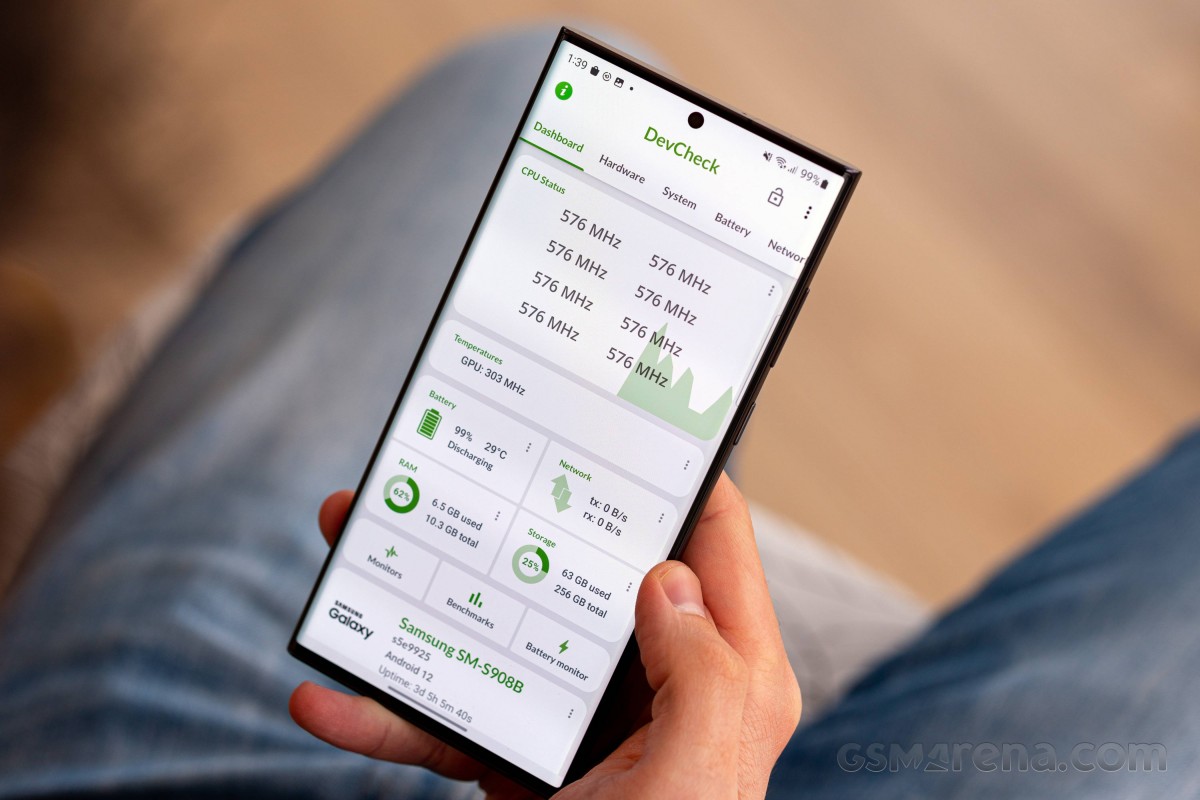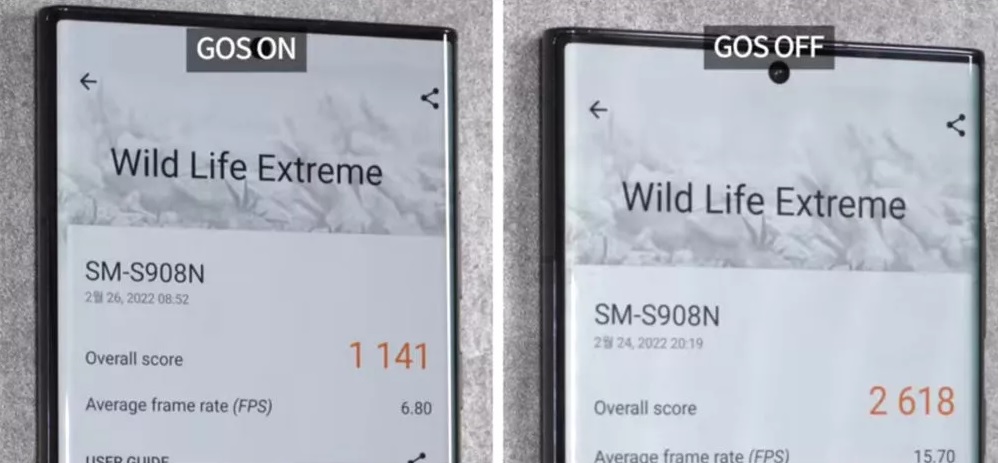Samsung has just been found guilty of artificially inflating the performance of their smartphones, so it's time to break down,
- What is happening?
- Why Samsung is doing it?
- How it's a problem?
- Why it's even more widespread than you think? and then finally
- How to solve it?
So smartphones are getting more and more powerful each year, We're annually promised a 20% to 30% performance improvement by manufacturers and chip makers and there's no two ways about it. This is a big part of why people upgrade but it is also kind of a lie.
What's just been discovered on Samsung phones is a piece of software known as the Game Optimizing Service or GOS, which is completely hidden. It runs in the background to limit the performance of many apps and games, that's already pretty strange but it gets worse when you realize that the apps that have not had their performance capped are benchmarking apps; the apps that people use to reassure them that their phone is in fact astoundingly powerful.
Now before I explain why this is such a problem, it's worth understanding why exactly Samsung is doing it. See mobile phones have constraints, there's only so much of a cooling mechanism you can fit in there and there's only so much of a battery you can fit in there. So while phone chipsets are getting more and more powerful each year.
Also Read: Here's How Samsung is Cheating its customers! Snapdragon vs Exynos which is best?
Qualcomm isn't lying when they say that in terms of peak performance, their latest Snapdragon 8 gen is 30% faster than their last chip. What they're not telling you is that the cooling mechanisms and the battery sizes in most phones, they aren't able to keep parity with that improvement if you just let a modern flagship chip run at full speed in a normal smartphone. It would not just suck your battery dry but would also get so hot that after just a few minutes would then have to drop its performance anyways to stop it from damaging itself.
So if you're in the middle of a game while this was happening you might well notice a sudden drop in frame rate because of this not ideal and so this is where Samsung's Game Optimizing Service comes in. It regulates performance, basically preventing the chip ever reaching its full power. Which while commendable in that it's only trying to protect the user to make sure that they never experience that sudden jitteriness or their battery life being zapped out of existence. I can't help but feel like it is also a little disingenuous because the implication of it is that all those numbers that were being quoted all the time.
Like Samsung telling us how much faster one phone is versus its predecessor. Chipmakers telling us how their new architecture is bringing us revolutionary improvements and benchmarking apps telling us that we're in the top one percent of all smartphones in terms of power; It makes them all meaningless.
You've paid for the hardware in your phone and so not being given the choice to use it properly and not being given the correct calling mechanisms for it to run as advertised that is an issue. Not to mention it would be one thing if Samsung had limited performance of all apps but for them to then give exemptions to benchmarking apps to make people think that they have a chart-topping device, only to then curb the performance when they think users won't notice that is where it becomes a bit manipulative.
Also Read: Do not ever buy this $450 USB Stick | 5G Bioshield Scam
Android Police did some clever work on this where they realized that if they re-labelled the Geekbench benchmark as a normal game such that the phone didn't realize it was benchmarking and so carried on limiting performance like it does with other apps. Then the actual score that came from this benchmark was 24% lower than when it recognized it.
Clearly, even Geekbench thought it was a bit cheeky as they've now permanently de-listed Samsung devices from using their service.
Basically saying Samsung has cheated their scores will no longer count. Here's the thing though, it's not just Samsung,
Apple had some big time trouble a few years ago for slowing down iPhones to protect battery life and they even had a 113 million dollar fine to pay for not communicating what they were doing to their customers.
Oneplus was caught in the middle of last year manipulating benchmark scores in almost the same way as Samsung.
Huawei was found doing it on their mate 20 pro. Xiaomi's done it, Realme's done it. As a matter of fact pretty much every smartphone company has done some sort of performance tweaking to limit the chip in normal apps and then push it to run at his best only when it's being tested in benchmarking apps.
It's a pretty widespread problem but I guess the most worrying part of it is that this issue, it's not going to fix itself; it's actually going to get worse if we don't correct it. Think about it, chipmakers Qualcomm and Samsung being two of the main ones, they're going to keep pushing to try and hit their yearly peak performance improvements, they have to that's their business model but the physical space inside smartphones for cooling and bigger batteries that is not increasing at all to accommodate.
It's pretty normal for a new chip to be announced with say a 20% efficiency improvement meaning that for each unit of performance you get it consumes 20% less energy. But then the same chip will also often come with like a 30% higher peak performance and while there is an overall improvement it also means that if you say push this new chip to its max then it will in fact consume more power than the last chip when that one was at its max and so if you wanted to keep your battery life consistent you'd actually have to use a lower percentage of the power available and at that point you're just paying extra for performance that you're not able to access.
Thankfully all of this confusion actually leads us to a very clear conclusion and it is the fact that Samsung's been using this Game Optimizing Service a problem yes but you know the CEO himself has publicly apologized and Samsung has now issued a software update to the Galaxy S 22 series to allow you to turn this optimization off. So is it all sorted? Then No.
The main issue here is not really that. All these companies are trying to silently stop the chips from overheating with software limitations. It's more the fact that they have to do this in the first place. This post is not me saying that Samsung's GOS is not doing its job because I mean if you look at the amount of power drawn both with this optimization turned on and then again with it off, you can see that it is pretty much halving the power consumption. But what this post is me saying is that if Samsung didn't use this GOS, you would have a deeply poor user experience and that is a problem.
Check this Article here to disable GOS on your Samsung Smartphones.
Also Read: Is Handheld Console Gaming Dying with the Rise of Smartphones?
So in order to actually fix it I think one of two things need to happen-
One is on the manufacturer's end:
If a manufacturer wants to use the fact that their phones are powered by a certain chip in their promotional material and they want to boast about how fast that phone is because of it. Then I think there should be a minimum level of cooling that they have to include to allow that chip to sustain close to its peak level of performance. If their phones are not providing the environment that allows these chips to work as advertised then they shouldn't be able to claim that they're being powered by these chips. Because an average consumer is going to be misled.
Second thing is on the chipmaker's end:
They shouldn't be focusing so much on hitting levels of peak performance that they know almost no phone will be able to sustain but instead focusing on making a more battery efficient chip that can keep its temperatures under control. If next year Qualcomm or Samsung managed to release a chip that is all around just 30% more efficient then even if they already bumped that peak performance by say 15% or so I would say that is a very good thing.
Does that mean we're getting a chip where phones can actually use all the extra power they're being given whilst also improving battery life, not reducing it.
So that was all in this post, hope you understood the whole problem. Do post your views in the comment section below and don’t forget to share this information with your friends and family who are using Samsung Devices or are thinking of getting one.









0 Comments